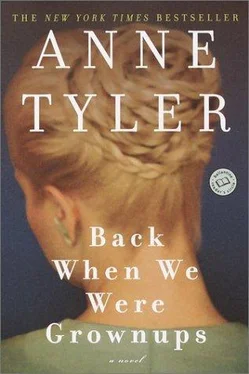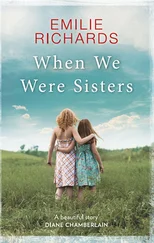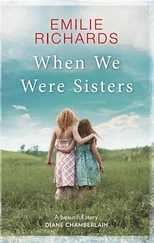“What say, Beck?” Poppy called.
“Nothing, Poppy. Never mind.”
* * *
The big surprise was, the wedding went wonderfully.
NoNo was a vision in her white chiffon dress, with her giant yellow-and-gold bouquet, and Barry made a very handsome bridegroom, and Peter, wearing his first grownup suit, seemed touchingly dignified. The backyard was more or less presentable, if you ignored the sort of wide-wale effect produced by the strips of sod that had not had time to meld together yet; and the dead azaleas (which would have to wait to be replaced by professional nurserymen) had been cunningly costumed in billows of white netting — a solution proposed by NoNo herself, although even she had not foreseen that the netting would attract a flock of tiny yellow butterflies so decorative that they might have been sewn on by an inventive designer.
It was too hot, anyway, for the guests to venture outside for long. Until the ceremony began they stayed in the house, which Alice Farmer had cleaned and polished to a fare-thee-well. Nobody would have known that a curtain rod had torn itself loose from the wall in a cloud of plaster dust only that morning. Barry’s family — his brother and sister-in-law, plus a couple of cousins — kept admiring this and that, asking if the dining-room fireplace actually functioned (it didn’t) and if the people in the portraits were actual ancestors (they weren’t). Most of the Davitches arrived not too scandalously late and stayed on their best behavior throughout, never once bickering or stalking off in a huff; and the grandchildren were models of deportment. It was true that Rebecca’s mother and aunt — in town just for the day, since neither one of them liked sleeping in strange beds — kept to the edges of the gathering, Rebecca’s mother wearing her characteristic who-are-these-people expression. But at least they came; at least they each accepted a glass of wine, and conversed agreeably when spoken to, and Aunt Ida was heard to observe that she hadn’t seen such a beautiful bride in donkey’s ears. (“Years,” Rebecca’s mother said. “What?” Aunt Ida asked. “Donkey’s years, Ida.” But Aunt Ida was already turning away to flash her sweetest and most winning smile at Peter.) Also, Tina’s hot-pink gown was put to shame by Alice Farmer’s sequined turquoise cocktail dress with matching feather tiara. Rebecca found this immensely gratifying.
As for the waitress who officiated, she was nothing like what Rebecca had feared. Demeter, her name was, and she was at least partly Greek, with one of those strong, noble Greek faces. She wore a simple black dress and carried herself as if she were supporting an entablature. Granted, Rebecca still wished they’d rehearsed. The “Wedding March,” for instance — played on the piano by Emmy and relayed to the backyard via Min Foo’s baby monitor — continued all the way through to the end while the couple stood sweating in the hot sun waiting for her to finish; and then Demeter asked, “Who gives this woman…?” which no one had thought to prepare for. Rebecca was just opening her mouth to say that she did, in order to move things along, when Tina finally said, “Oh! Me.” But she was repositioning her corsage at the time, so that it seemed she was merely sort of tossing off the bride.
Well, these things happen. What mattered was that Barry and NoNo really appeared to enjoy their own wedding. As soon as the ceremony was finished, they moved back indoors and Zeb took over the stereo and people started dancing. Rebecca watched from the sidelines, smiling. She was wearing a red silk dress with a many-tiered skirt, and she felt like a gypsy queen. Everything that Biddy’s waiters offered her, she accepted — little canapés and stuffed pastry shells and several glasses of champagne. All of it tasted delicious. And the cake, when they wheeled it out, was a work of art: six layers, each decorated with a different kind of sugar flower to reflect NoNo’s profession. Unfortunately it listed to the right somewhat, but Barry and NoNo cleverly solved that problem by listing to the right themselves, arm in arm, when they posed behind it for the photographer.
The best thing about being stepmother of the bride was that Rebecca didn’t have to think up one of her rhymes. Troy offered the first toast — a nice little rumination about what couples learn from each other as they travel together through life. “From Biddy I have learned caretaking,” he said. “Feeding, nurturing, nourishing,” and he raised his glass to Biddy across the room, which made Rebecca a little teary because she had never before considered what Biddy had brought to Troy; it had always been the other way around. Then Barry’s brother delivered a humorous speech about Barry’s improved taste in women, and then Poppy struggled up from the couch to propose his toast, although he got confused and started reciting his poem instead. He was partway through it before Rebecca realized what was going on. (“ If you weep away the days, or you try not to weep, or can’t, ” he was intoning, “ And pace the floor all night and sleep at dawn… ”)
“Poppy,” she called. “Wait.” He paused, lips still parted, and turned so blindly in her direction that it stabbed her heart. She threaded her way through the crowd and came up and hugged his nearest arm to her breast. “A toast to NoNo and Barry,” she whispered into his tufted ear. “Long life and happiness.”
“Eh?” he mumbled. “Oh.” He turned to the others. “Long life and happiness,” he echoed. Then he seemed to collect himself, and in a stronger voice he added, “May your marriage be as happy as Joyce’s and mine was!”
Everybody clapped, and Rebecca squeezed his arm tighter and kissed his cheek.
“I got a little mixed up,” he told her as she helped him sit down. “But it was just for a second, there. I don’t think anyone noticed.”
“Not a soul,” she assured him. “Can I bring you a piece of cake?”
“I believe it was hearing the vows that took me back,” he said. “Seems like only yesterday I was saying those vows.”
“I know, Poppy.”
“People imagine that missing a loved one works kind of like missing cigarettes,” he said. “The first day is really hard but the next day is less hard and so forth, easier and easier the longer you go on. But instead it’s like missing water. Every day, you notice the person’s absence more.”
“I know.”
“But I surely never meant to spoil NoNo’s wedding.”
“You didn’t spoil it! You were fine,” Rebecca said. She caught a waiter’s attention and beckoned him over. “Look,” she told Poppy, lifting a plate of cake from the tray. “Fondant icing! Your favorite.”
“Ah, yes,” he said, brightening.
The photographer — just a college boy, a friend of Dixon’s — snapped Poppy’s photo as he raised the first forkful to his mouth. “I think I got that,” he told Rebecca.
Then Zeb came up and invited her to dance. The stereo was playing “Band of Gold.” “Where did that come from?” she asked as she stepped into his arms.
“It’s one of those 1950s collections,” he said. “Looked like good slow-dance music.” He steered her into Min Foo by accident and murmured, “Sorry.” Min Foo was so pregnant by now that Hakim had to hold her practically at arm’s length, leaning across her belly to set his cheek against hers. It made Rebecca laugh. Zeb drew back to smile at her. “You’re having fun, aren’t you,” he said.
“Yes,” she said, “I am.”
In fact she might have been tipsy, because everything made her laugh, after that. She laughed when Tina waltzed by clinging firmly to Peter, who wore the shocked, frozen look of a hijacking victim. She laughed when Alice Farmer, whose church forbade dancing, started swaying her head to the beat so enthusiastically that her feathers must be setting up a breeze. She laughed when “Band of Gold” switched abruptly to “Sixteen Tons” and everyone came to a stop and looked helplessly at everyone else. Then Dixon’s friend herded them outside for a huge group photograph. “Could the people not related by blood get over on the left end?” he asked. “Just in case, you know. Because I’m not absolutely sure I can fit you all into the picture.”
Читать дальше












